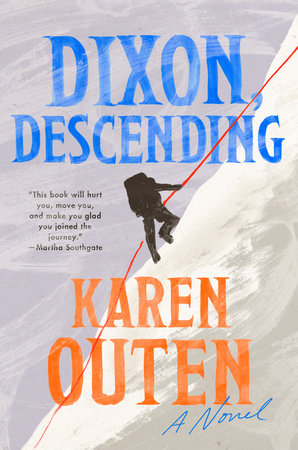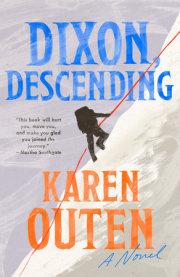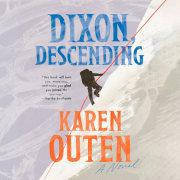1
March 2011, Mount Everest
This first time, as they hoisted themselves onto the hip of the mountain, they had to simply learn to survive. Survive the landscape, the thin air, the unbelievable cold, the exquisite suffering. Each step of Dixon's crampons on ice was accompanied by a headache so intense he thought a tiny demon jabbed a pitchfork endlessly inside his ear. His stomach cramped, his tongue swelled against the roof of his dehydrated mouth, he inhaled heavily-at 18,000 feet and rising, his every breath was hard won. A perfect, exhilarating orb of suffering.
His brother Nate climbed just in front of him along a narrow path that stretched between ice boulders. Nate looked back at him, panting lightly but smiling, his black goggles gleaming on his face, rock star-like. "Man! We're in rare air. Black men on Everest." Dixon repeated it with awe: Black men on Everest, which was to say freed men. Because their burdens here were of their own making.
Blue-white ice glowed above their heads. They were climbing just above Base Camp, deep in the Khumbu Icefall, a once-cascading river frozen mid-flow. A surreal landscape of ice boulders at improbable angles perched along cliffs. The ground rumbled beneath their feet. A game of dodgeball, judging which boulder might tumble toward them. And this only their first acclimatizing trip up the mountain; there would be three climbs, up ever higher, then back down, before they attempted the summit. Three more chances to lose this survival game. An improbable game growing ever more ridiculous: not just skimming boulders but spanning crevasses so impossibly deep they might emerge on the other side of the earth.
They had chosen this, Dixon reminded himself, and squinted into the glare ahead of him. A stunning flash, a warning flare: the sun bounced off the aluminum shell of a ladder-four ladders, actually, lashed together and spanning a crevasse slit deep and jagged in the ice. And he was expected to cross it. Unfathomable, all of it, crevasses, ice blocks, mountains. A thrill seized his groin. He turned toward his loosely tethered band of twenty team members, sherpas, and guides, their red and blue and yellow down suits iridescent against the snow. Lunatics did this kind of thing, lunatics and heroes, Dixon thought, laughing, and which did he think he was? "Both!" he said aloud.
Nate waited for Dixon near the ladders, hands on his hips. "Well, this might be it, know what I mean?" Nate leaned close so Dixon could hear him above the wind. "That oh-hell-no moment." He made a sweeping gesture across the Icefall. Ahead of them, the ladders were strung with safety ropes and bolted into the ice on either side of a crevasse. They still didn't look like a good idea.
Dixon lifted his goggles and squinted at his brother, who stood one hand on his hip, a sly smile on his face: a challenge Dixon knew well. "You expect me to believe you're throwing in the towel?"
"Hell no." Nate laughed. He flexed his fingers against each other, tightened his gloves.
"How 'bout I go first," Dixon said. He did not wait for an answer.
Don't look down, Dixon warned himself, but how could he help it? The pale-blue walls of ice below him darkened into a bottomless midnight. He stepped onto the ladders, his crampon spikes clunking on the metal rungs. The ladder swayed and complained under him, his body both weighed down and weightless in the thinning air. The wind howled around his ears. His heartbeat resonated in every vein, every muscle, every clench of his hands around the safety ropes. Thin ropes in his hands, slender rungs under his feet, he teetered above Earth. A gust of wind bellowed in his ears and seemed to lift him like a kite. A belly drop, Dixon gripped the ropes as he felt himself caught up by the wind. The frightening roar in his ears. Dixon suspended midair. It seemed an endless ride on the bounce of wind. He was sure he would be swept away. He could not breathe. He might have expected his life to flash before his eyes, but he saw only sky, endless blue clouds swirling shapeless above him. It wasn't death he feared, but the feeling of nothingness, of expendability at the whim of the mountain.
That jolt of air swept under him only momentarily, but Dixon was badly shaken. Mountain peaks loomed around him, the crevasse beneath him like a dare. He scrambled across the ladder to the other side, his breath heavy, his body trembling, a bead of fear trickling down his spine. The mountain had given him a stiff warning.
Like God, Everest had a sense of humor, which Dixon discovered days later climbing through the Western Cwm halfway between Base Camp and the summit. He wore a thick down suit as he trudged through dense snow, and unbelievably, it was hot as hell. Just that morning his socks had been frozen stiff. Now, sweat poured down his cheeks and welled along his collarbone. He tried to imagine convincing anyone back home that Everest could be this way. Wily. Winsome. In the snow-covered bowl of the Western Cwm, the wind died down and the sun sparkled along the snow until Dixon saw stars twinkling and dancing off the ice; he tripped lightheaded through the galaxy.
"Practically beach weather," Nate croaked out, his voice thin. Nate's dimpled cheeks wet with sweat, his medium-brown skin tanned a reddish-chestnut in the sun. Dixon flashed to their childhood summers at the Maryland shore, slathering on their mother's concoction of iodine and baby oil as suntan lotion, then sliding slick and dark as eels into the water. He might be there now, they might be boys playing if he squinted his eyes just right, the glare of sun off the brittle snow like the glare off water.
In the nearly eighty-five-degree heat, Dixon slipped his rucksack from his shoulders, removed the jacket of his bright blue snowsuit. He tossed his head back, drinking up sun, and Nate piled a handful of snow under Dixon's hat. Nate laughed. A tease, a comfort, Dixon let the snow melt and trickle down his neck.
Nate unzipped his one-piece snowsuit, slipped out of the top half, and let it bounce around his waist. Hadn't Dixon warned him to get a two-piece suit for just this reason? Dixon frowned.
"It's like a reprieve before the execution," Nate joked and swept his hand wide. In the gentle slope of the Cwm, which spanned the mountain's belly, they had stripped to T-shirts and bandannas, their sunglasses tightly secured. They might be miners or the Seven Dwarfs coming home from work in lockstep across the snowy field. Their smallness stood out; their impressions on the landscape were only minuscule. The surface vast and snowy, they were surrounded on three sides by mountains, one a looming glacier that stood between them and the top of the world. Just now, Dixon thought, they were safe and warm, weren't they? The altitude must be already making his thoughts fuzzy. Because all of this, the sun, the feeling of brightness, all of it was deceptive-ah, Everest was always up to something. And as if she had heard him, the mountain rumbled and shifted, the snow dust of a far-off avalanche blowing toward them, a sprinkler on a hot summer's day, so they threw back their heads to drink it in.
Soon, Everest returned to form as they ascended the Lhotse Face, a steep, vertical sheet of glacial ice. Nate let out a bemused laugh. "You gotta be half billy goat for this."
"Don't see any of those living up here."
"Nope, just us paying fools." Nate latched onto the safety rope.
They headed up the Lhotse Face, their sherpas beside them, their teammates before and behind, but they may as well have been alone. Dixon focused only on Nate in front of him. Clipping their jumars onto the rope, sliding the jumar up, kicking their crampons into the blue ice of the Face, they lifted themselves, then rested; slide, kick, pull, rest; slide kick pull rest over and over, a steady rhythm echoing their breath. When he was a runner, Dixon had loved following the cadence of his breath, the sound of his spikes hitting the track. He had loved the gift of his body: the span of his arms, the strength of his calves, the fluid grace that propelled him over high hurdles. He simply did what was in him to do. In high school, coaches had said he could be the next Renaldo Nehemiah, and for a time he had willed it, posting signs around his bedroom: "High Hurdles Under 13 Seconds like Nehemiah!" He had so deeply imagined that triumph, smelled it, tasted its sweetness, cradled it in his arms at night. He had missed qualifying for the Olympics at national trials by two-tenths of a second. Two fucking tenths! For weeks afterward, his failure so raw that his skin felt bruised, he had not been able to bear being touched. Never again, he had decided, would he give over to such excruciating wanting. And he had not. Until now.
He yielded to the kick, rise, pull, the sheer desire for this mountain.
Sheer desire. It wasn't a gentle thing. He couldn't decide when the wanting was worse, when the mountain's bare rock shone like obsidian, or when clouds veiled the sharp bones of the summit. Sometimes desire overtook him with an angry impatience. Like now, as Nate climbed in front of him up the Lhotse Face, moving with more ease while Dixon fought through each miserable, withholding breath. Nate was taking to altitude the way Dixon had always taken to running. Nate's ease-a thing Dixon had imagined rejoicing over-rode hot under Dixon's collar, rising into full-blown fire across his cheeks. Because Nate moved closer to the summit with each step.
Dixon slid, kicked, pulled up the icy face of Lhotse, lulled away from the mountain's dangers by sheer tedium. But discipline was Dixon's forte. He trusted himself, and with a chill, he glanced at his brother. Did Nate double-check his clip, did he hold the safety ropes, had Dixon taught him well enough? Dixon mouthed up toward Nate, "You got it?"
Nate gave a slow smile that soon faded, the hard work of climbing etched on his face, but then he smiled again. Charming Nate. Even as a toddler, he could peek out from his stroller, bat his long lashes, flash his dimple, and make women swoon. Dixon, only sixteen months younger than Nate, had learned to lean to the right in the twin stroller to let himself be passed over. With a disarmingly handsome older brother, Dixon had to become someone in his own right: he became a good boy.
Wasn't it natural, then, that Nate would be the one to woo Everest? At Base Camp the day they arrived, when they had finally stood at her feet, Nate had squared himself, rising to her glance, and the sun had broken over the mountain's face. Of course. For his part, Dixon had been stunned by how the mountain dominated the sky. He had sucked in a hard breath and stumbled backward, tripping over the uneven ground and landing on his butt. The mountain was so beyond his imagining, with terraces of slate and ice that spiraled up toward the summit, their broad, imposing presence like the arms of God.
"She's beautiful," Nate said with a calm admiration while a bewildered Dixon found himself only able to steal looks toward the summit.
As they ascended, Dixon noted his brother's slow, steady pull up the rope, the intensity and sweat on his face-he did the hard work! Dixon quietly congratulated himself: he had trained Nate over the past six months, and wasn't that training paying off? A steady calm fell over Dixon; the cool, clear wire that had always been his recompense for goodness resounded in him, a measure of the world and of Dixon's place in it.
A hundred feet higher, the mountain revealed the depths of the crevasse below. At first, Dixon thought he saw below him the colorful prayer flags that waved above Base Camp. A lightning jolt of recognition as the forms morphed: a blue arm, a yellow torso, a red elbow, the black stretch of snow pants, the green toe of pricey climbing boots. A wash of terror flushed through Dixon. Bodies lay below him like broken marionettes, legs akimbo, arms overhead, lifeless in snowsuits still stalwart against the cold. Dixon stalled. A long, trembling beat. And then the high siren call of wind, the tickle of snow against his cheek. The call, the awful call. He slid, kicked, climbed.
Later, he would remember the many ways the mountain had revealed herself, and he would wonder: Why did they excuse her fits of temper, cajole and caress and long for her, as if they would be spared?
Copyright © 2024 by Karen Outen. All rights reserved. No part of this excerpt may be reproduced or reprinted without permission in writing from the publisher.






